See page 3


See page 3

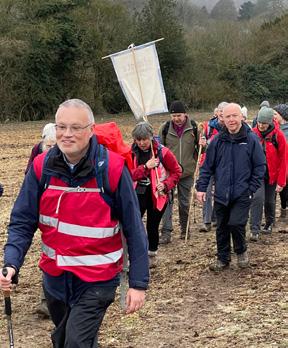
See page 8 The power of pilgrimage
St Augustine’s launches new master’s degree
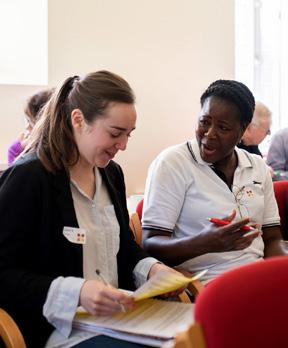
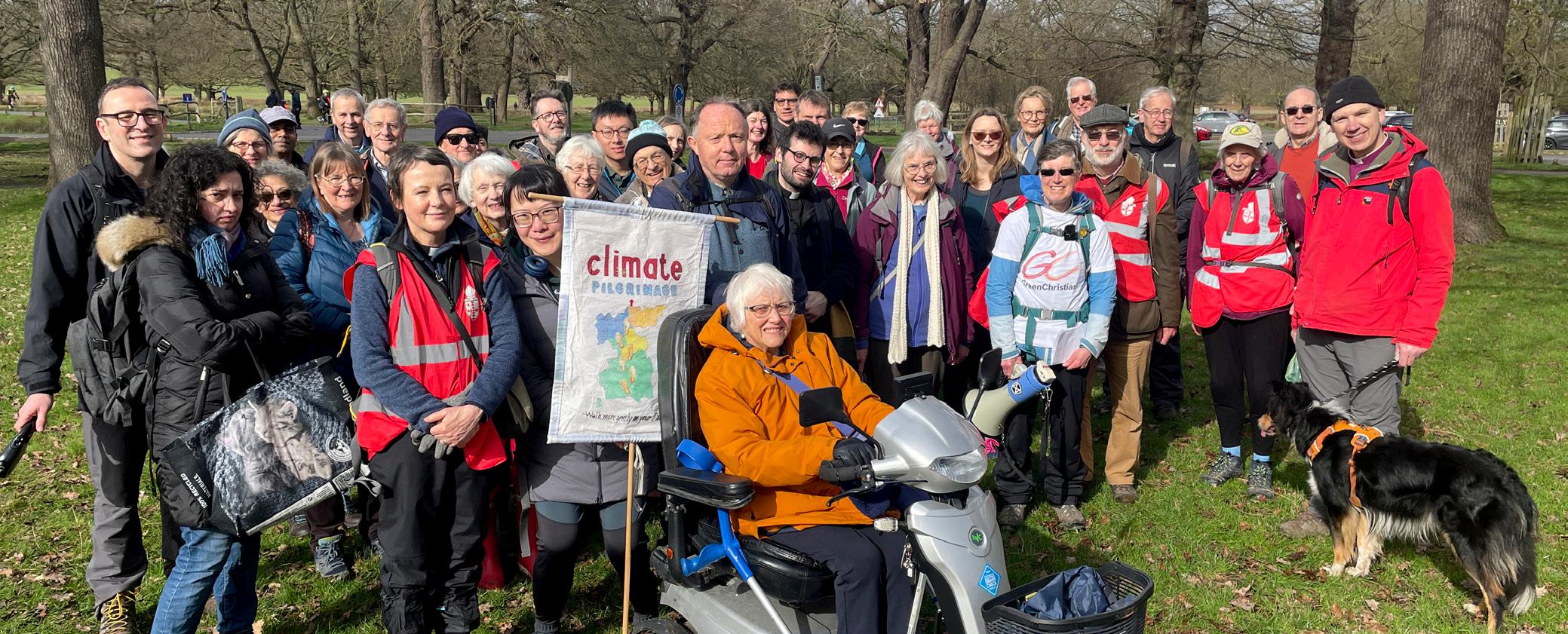
Continued on pages 6–7
In March, 30 children from St Stephen’s Primary School in year groups 5 and 6 visited Chengdu, China.
St Stephen’s is a small school with big aspirations – located in the semi-rural village of South Godstone, Surrey, 90% of children at the school are of white British ethnicity.
The international trip was an opportunity for children to experience another culture with the aims of challenging stereotypes, developing a deeper appreciation of their own culture and others whilst building confidence and resilience. Amanda Blackburn, Executive Headteacher writes: “The socio-economic backgrounds of our
community are diverse and as a school, we actively create and expose all our children to a wide range of opportunities to broaden their experiences and improve their ambitions for their future.
“Our week in Chengdu achieved all of that and more! We spent three days at our partner school, Sichuan Tianfu New Area Yuanyin Primary School, where our children were buddied up and able to experience a mixture of immersion in different classes and standalone special lessons like calligraphy, ceramics and Kung Fu. The daily whole-school exercise outside was a favourite amongst the children and staff. It was impressive to see how quickly bonds were formed between our
children and their buddies and there was real emotion as they bid farewell to each other at the end of their time in school. We were also able to spend three days exploring the sights, sounds and tastes of Chengdu; visiting the Chengdu Panda Base was a highlight, as well as exploring a variety of restaurants and shopping.

“We were supported throughout the process by Global Schools Alliance – who help support schools in the UK with an international partnership – right from submitting a successful application for funding, through to planning the itinerary and providing a knowledgeable local guide to accompany us during the trip.
“To say that our visit was transformational feels like an understatement – the experience was enriching, moving and motivational for both the children and staff. It has brought us closer to achieving our aims as a school of preparing our children to embrace the future with hope, faith, confidence and compassion, believing that they can do all things through Christ.”
Pilgrims on the Kingston–Merton leg of the pilgrimage for climate change. © TimThe wait for Pentecost is a vitally important moment in the life of the early Church. What was happening in the hearts and lives of the first witnesses of the resurrection, the hearers, the followers and learners of Jesus?
They were likely exploring all Jesus had said and done in his 33 years on earth, in light of his physical resurrection and ascension. The disciples were doing as Jesus had told them – I’m sure this came with human fear, worry and conversation.
In Acts 1 Jesus ascends just after he told the disciples to wait for the gift promised by His Father (of which he had spoken about in John 14).
A new ‘drenching’, not with water this time, but with God himself, the Holy Spirit.
The wonderful ascension of Jesus caused jaws to drop and eyes to stare into the sky and in verse 11 we hear the angel say “…why do you stand here looking into the sky? This same Jesus will come back in the same way.”
They were then waiting for two things – the baptism of the holy spirit, and the return of the risen Messiah. During these few days, the disciples prepared for the unknown time of the Holy Spirit arriving in power for their mission as witnesses of Jesus to Jerusalem, Samaria and to the ends of South London and East Surrey. “They all joined together constantly in prayer…” (Acts 1:14)
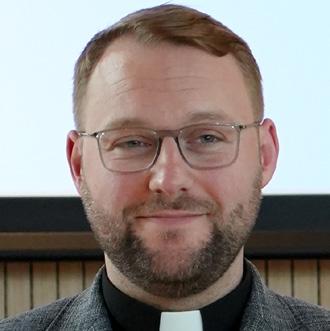
and they ‘sorted out’ replacement mission leaders, again, through prayer.
In my role as Dean of Revitalisation, I am focused on how we wait for the return of Jesus, reaching the world from our localities. There are many local things that demand our attention and we have much to learn from the disciples wait for Pentecost, to pray continuously. Herein lies the answer. Commune with the Father in prayer, enthused and guided by God’s words in the scriptures. Avoid just ‘staring into the sky’.
The Church received in power the Holy Spirit at Pentecost, and it is still among us as we choose to live by the Spirit in holiness – allowing Christ to be Lord of our lives, in word and deed.
To transform even one person with the gospel is impossible for humans, but as Spirit-filled, continuously praying witnesses of the risen Christ, we have all we need to get on and do as He asked.
We pray ‘Thy Kingdom come’ and invite people to know Jesus and join with the eternal Church on mission as many say ‘yes’ to Jesus before he returns.
Charlie LamontThe Bridge is produced & published by: Communications Department, The Diocese of Southwark, Trinity House, 4 Chapel Court, Borough High Street, London SE1 1HW Tel: 020 7939 9400 Email: bridge@southwark.anglican.org
The Editorial Team from the Communications Department: Commissioning Editor: Anna Drew
Editor: Vernia Mengot
Advertising and Distribution: Joseph Callanan
The Bridge —
Editorial Group: Nicola Thomas Alastair Cutting

Bishop Christopher: Gaza: war must stop
Bishop Christopher has written a comment piece for The Independent calling for the war in Gaza to stop after seven aid workers were killed by Israeli drone attacks on 1 April in Gaza.
In the article he said, “This war must stop and it must stop now… We must refuse to give up hope – Gaza is not a lost cause and the international community must not stand by and wring its hands in despair, as if nothing can be done. We can make a difference and we must do whatever we can to bring lasting peace to this region.” The article calls for an abrupt wake up call, with immediate ceasefire, the release of all hostages and sustained humanitarian access for the provision of essential supplies to those most in need: “Enough atrocities in Gaza; enough violence, enough death, and destruction.”
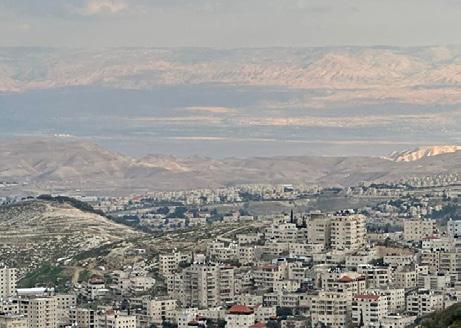
You can read the full article at: bit.ly/4aAxu02 (Paywall)
Richard Taylor RIP
Campaigner Richard Taylor OBE, died on Saturday 23 March 2024 after a prolonged battle with prostate cancer. Richard was the father of Damilola Taylor who was killed at the age of 10 in south London 24 years ago. A former Nigerian civil servant, Richard dedicated years to campaigning about the effects of knife crime. He set up the Damilola Taylor Trust to improve the lives of disadvantaged children, offering a number of outreach programmes including internship schemes, educational courses, and mentoring projects.
On 7 December 2021 – on what would have been Damilola’s 32nd birthday – a ‘Service of Hope’ took place at Southwark Cathedral. Attended by many people connected to the Trust, it was opportunity for Richard to say thank you to all the people who were involved.
More information about the Trust can be found at: damilolataylortrust.co.uk
During Dying Matters Awareness Week (6–12 May 2024) communities across the UK have the opportunity to come together and talk about the language that we use around death, dying and grief.
There are a range of resources available from Hospice UK – the national charity for hospice and end of life care – and lots of information about the support available to people who need help to have difficult conversations with family, friends or anyone in your church community.
More information can be found at: bit.ly/3POwkWq
The JUNE edition is due to be published online and in print on 1 June 2024. Material for that edition must be with Vernia Mengot by email by WEDNESDAY 8 MAY.
Space limitations mean that we cannot guarantee to publish everything we receive and material may be edited. All photographs submitted for publication are assumed to have the necessary permission for printing. Please ensure that people are happy for their photographs to be submitted before you do so. Forms for permission for the use of photographs of children (Form 10) and adults who may be vulnerable (Form 11) can be found at southwark.anglican.org/safeguarding/diocesan-policies-procedures

The Church of England’s Strategic Mission and Ministry Investment Board (SMMIB) has awarded nearly £8.5 million to Southwark, Canterbury, Durham and Hereford Dioceses to help churches spread the Christian faith, including parish renewal programmes and children’s and youth work in rural and urban areas.
These grants have been approved for mission from the north of England to the Kent coast, much of it in low income
areas. This includes Bubble Church – a worshipping community for young families, that uses puppets and song to help tell Bible stories and talk about the Christian faith. The first Bubble Church started in Southwark Diocese at Ascension Church,
Balham, (pictured) and was set up during Covid restrictions in 2020, taking its name from the socially distanced ‘bubbles’ in which parents and children gathered for the new church.
Bubble Church has grown exponentially faster than was originally planned, expanding from five churches to 30 since 2022. This has resulted in a further award of £145,423 from the SMMIB to fund two support staff and help churches with Bubble Church start-up costs in lower income communities. It comes after the initiative received £250,000 in 2022 for expansion.
Keli Bolton, Bubble Church Mission Enabler said, “We are overjoyed to see how Bubble Church has grown in these first 15 months. It’s been incredible to partner with churches across the nation as they connect with their local young families, and to see what God is doing in different communities!”
“All the proposals will help deliver the Church’s Vision and Strategy for the 2020s whilst reflecting the different contexts and needs of the parishes and local communities in which they are rooted.”
Carl Hughes, Chairman of the SMMIB said, “The Strategic Mission and Ministry Investment Board is very pleased indeed to award these grants for promising plans that we believe will help support the local church in the core mission of spreading the Christian faith, many of which build on previous investments.
“We are overjoyed to see how Bubble Church has grown in the first 15 months.”
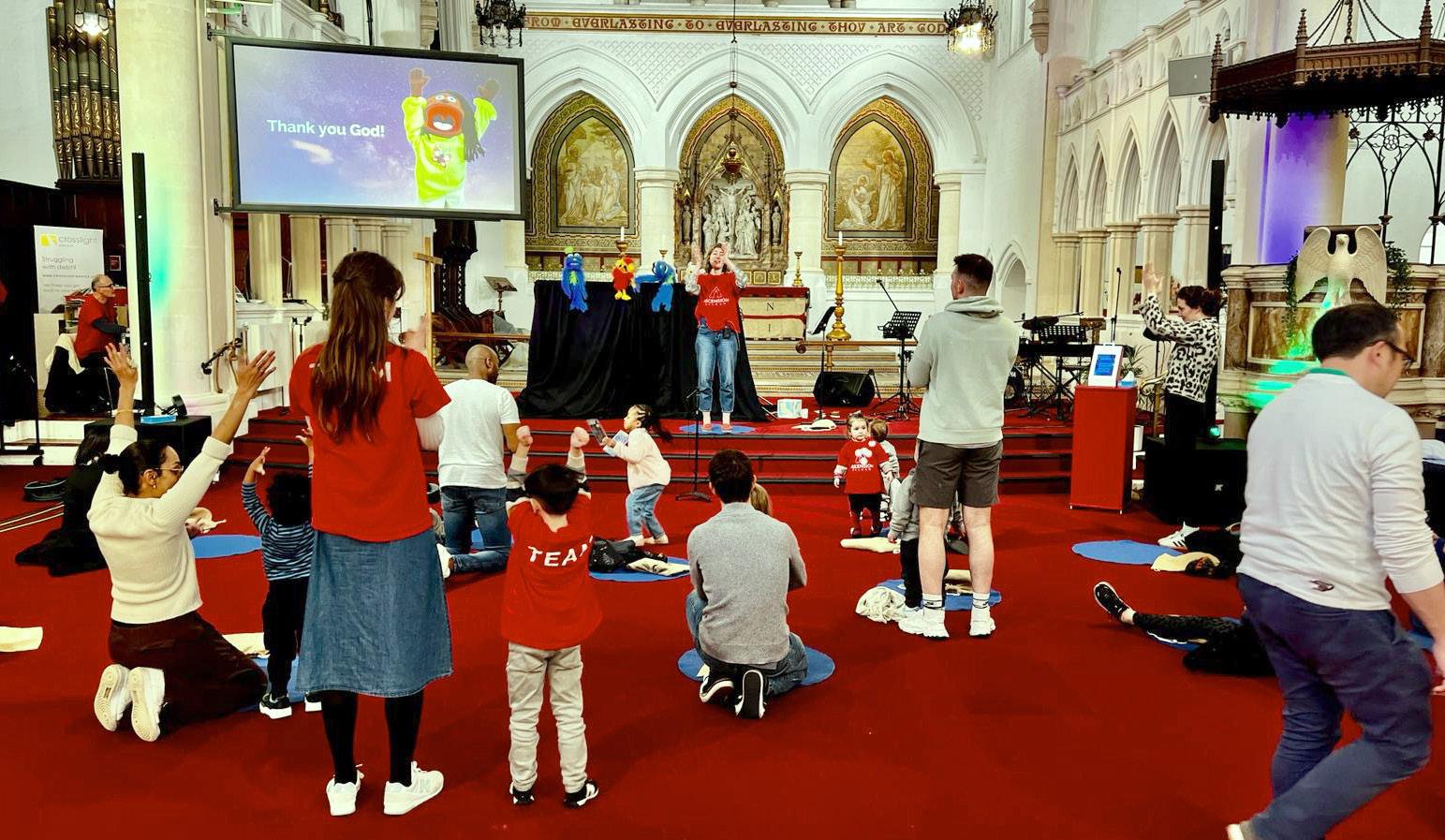
Global ecumenical prayer movement, Thy Kingdom Come (TKC) has launched. This year’s theme is ‘Light up the world in prayer’. Each day between Ascension and Pentecost (9–19 May 2024) Christians around the world are invited to unite in daily prayer to pray for more people to come to know Jesus.
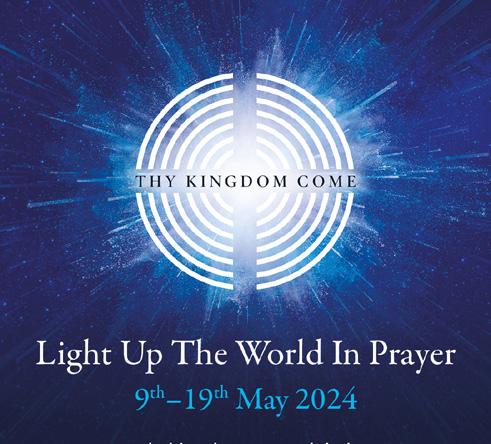
During TKC we are called to pray as the disciples did in the early Church in Acts 1 and 2. Watch the TKC 2024 launch video here: youtu.be/3k3pIwVqisA
“In praying ‘Thy Kingdom Come’ we all commit to playing our part in the renewal of the nations and the transformation of communities.” Archbishop Justin Welby
There are lots of resources available to support in you in taking part in this year’s TKC.
The Novena is written by Bishop Anthony Poggo, General Secretary of the Anglican Communion and is based on the Book of Revelation.
The Prayer Journal is a pocket-sized journal that explores and encourages
different styles of prayer from across different and traditions: from Ignatian prayer to prayer walking, contemplative prayer to using art. This year’s journal features artwork by the Revd Chris Duffett, Baptist Minister and former President of the Baptist Union of Great Britain. The images are also available to buy as postcards.
A Workplace Prayer Diary created by Transform Work is available to help workplace prayer groups join in with TKC.
Children and young people will be able to join in TKC by using a selection of postcards which feature the Cheeky Pandas and Jesus Storybook Bible –featuring high profile Christians helping to tell the Jesus story, The Way – a series of digital videos exploring ‘Living for God’ aimed at older teenagers and students and The Prayer.
On Pentecost Sunday TKC are encouraging young Christians and youth groups to gather in the evening to join in a time of prayer and worship, including
“All the proposals will help deliver the Church’s Vision and Strategy for the 2020s whilst reflecting the different contexts and needs of the parishes and local communities in which they are rooted.”

a time of saying ‘The Prayer’ – The Lord’s Prayer – together. Archbishop Justin and Archbishop Stephen will both be attending youth gatherings on Pentecost Sunday.
There are several other resources available for your parish. Copies of the following are available to collect from Trinity House:
• Hidden church
• Everyday faith
• Prayers for workplace
• 2024 Novena
Small grants of up to £100 are also available for parishes wishing to celebrate Thy Kingdom Come, for example to cover the cost of setting up a prayer station or for printing costs. Download and fill in the application on our website: southwark.anglican.org/tkc

Schoolchildren at Christ Church Primary School in Purley, have been challenging racism and addressing the need to create more diversity in our school communities.
Earlier this year, the school achieved the Anti-Racist Schools Bronze Award presented by Leeds Beckett University and the Centre for Race, Education and Decoloniality (CRED) which focuses on challenging everyday racism and structural race inequalities in education.
The award comes after the school made sustained changes to their curriculum, school environment, policies, recruitment and community links in order to make the school a fairer and more equitable place for people of all backgrounds.
The development of their pupil council –the Anti-Racist Ambassadors – has been described as one of the most powerful ways in which they have been able to make positive changes. Some of the children’s work includes developing a ‘cultural inclusion lunch pledge’ for pupils and staff, reviewing the diversity of images within collective worship and creating videos to educate the school community on issues of race and anti-racism.
Bell Sunday – 12 May – is a chance to celebrate the contribution of bell ringers to the life of the Church, and acknowledge the part that bells play in worship and community life all year round.
Across the country many churches will join in to raise awareness and highlight the importance of the sound of bells in our communities. Some might hold a service on the day or include music and readings relevant to ringing. Some could involve a talk about the distinctive English style of ringing, a chance to hear some bell ringing, visit a tower, or simply serve bell-shaped biscuits with coffee.
Some of the ambassadors collaborated with Spinnaker Trust – an organisation that provides Collective Worship and Religious Education lessons in London and the South East – to review the images used in their collective worship series entitled: ‘It’s Jesus’. The children helped to evaluate the examples of diversity in the images and to identify areas of growth.
Joel Lane, Assistant Head Teacher at the School said, “Seeing the way that the children are able to articulate their thoughts about equality and diversity has been very special. For example, when we reviewed the collective worship images, one of the children said ‘It’s a bit like a salad – you couldn’t have a salad with just tomato – you need the other parts like lettuce, cucumber, carrots. In the same way, our images should represent our whole school.”
Rachel Phillips, Education Advisor at The Southwark Diocesan Board of Education said, “Congratulations to the pupils and staff at Christ Church. It is wonderful to celebrate the powerful learning and community being developed at the school as well as share their work in equity, diversity and inclusion with others across our diocesan family of schools”.
Bell Sunday is typically kept on a Sunday close to St Dunstan’s feast day. St Dunstan is known as the patron saint of bell ringers due to his experimentation in the early forging of bells in the 900s and his encouragement of the use of bells in parish churches.
An initiative of the Central Council of Church Bell Ringers – the representative body for all who ring bells in the English tradition – Bell Sunday is also being supported by the Clerical Guild of Ringers, a group of ringing clergy who help to foster good relations between bell ringers and the Church.
Revd Max Drinkwater of the Guild said, “Bells have always been a connection between the Church and the world.
“They are usually rung from inside the Church but heard for miles around, often rung at the start or end of an act of worship as people gather or leave and involving large numbers of faithful people who might otherwise not engage with other aspects of Church life. Bell Sunday is a chance to acknowledge
Last year, the parish of All Saints, Sanderstead launched Christmas Unwrapped – an engaging, hands-on way to invite schools into church to learn more about the events of the Christmas story in a fun and interactive way.
Having received a grant from the Children and Young People’s (CYP) team the church was able to share the miracle of Jesus’ birth in its community and enable local school children to discover and immerse themselves in the Christmas story.
This was an opportunity to nurture the relationship between the church and school communities. The church ran six sessions over two days, each with 30 Year-1 children from three local schools. Through unwrapping parcels and finding clues the Christmas story was unravelled and the children took home four handmade crafts, as well as a large class book they had created as a group during the session.
Judith Robinson, CYP representative at All Saints said, “Jude Barber who wrote the resource, kindly came to a planning evening to explain the running of the session which was a huge help – enabling it to run very smoothly on the day! It was a lovely way to start Christmas and we had some very positive feedback from school staff, children and accompanying parent helpers. It was a highly successful way of engaging 180 children from the community in the real meaning of Christmas. It is an excellent resource that is well written, clear and easy to follow.”
For more information about Christmas Unwrapped watch this video: bit.ly/444bg42 – and if you would like to hold an interactive session in your church with your local school – please contact: Joanne Gavin or Imani McEwen at CYPadmin@southwark.anglican.org
To restart or grow your children’s ministry with a CYP grant, apply here: bit. ly/4d2gyB0. CYP grants can also be used to fund training that benefits the ministry of those working with children, young people or families.
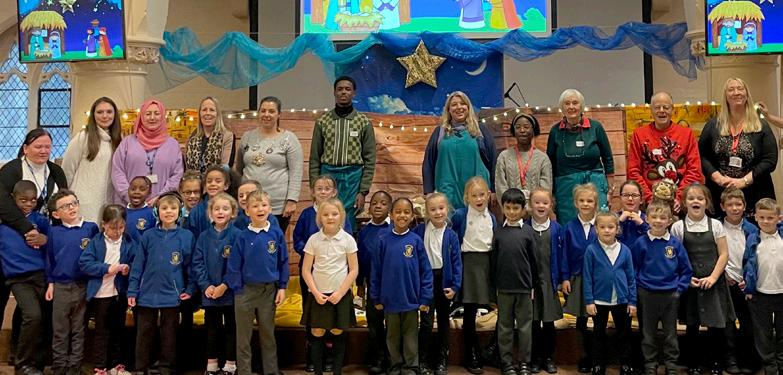
that contribution to the rich diversity of activities that bring people together in and around the church.”
“Bells have always been a connection between the Church and the world.”
Members of the Guild have written a book for church leaders and members who want to explore the role of bells and bell ringers in the Church of England. ‘The Voice of the Church’, published by the Ringing World, looks at ringing and the Church from a historical, sociological and theological perspective.

For information and resources on how bellringing can take an active part in bellsunday.org
took
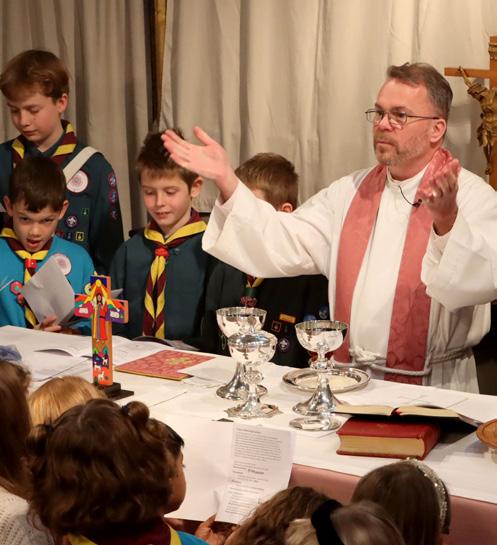
Over the past year, Horley Team Ministry have been fostering ways to improve men’s mental health and provide fellowship and support for men in the community.
Tim Hill, Children and Youth Pastor, Horley Team Ministry writes:
There were – you may have noticed – an excessive number of bank holidays in May 2023. Our Men’s Fellowship Group decided to get stuck into some physical work on those days and there was much to do. We are blessed to have a ‘Michael’ (every parish should find one!), who seems to tackle all the jobs that need doing – fixing bits that have fallen off, digging holes or filling holes in – a ‘Michael’ like this is a grafter and we got behind ours to make a difference in the graveyard and in the car park too.
With several very large events looming (a rock choir event that raised £1,500 for St Wilfrid’s roof fund and a visit from Bishop Christopher to give thanks for the new spire at St Barts) we had to reclaim the whole of the large community car park beyond the Six Bells pub, in Horley. A group of men aged between 11 and 77 gathered several times and dug, cut, scraped and wheel-barrowed for hours at a time. The car park had been overgrown
and half the spaces were unusable but by the end of the days spent working all 80 plus spaces were clear of brambles, litter and muck.
It felt good to bond. We celebrated at the Six Bells with a lovely lunch and the fellowship grew stronger.
We also meet on Zoom for bible study and have a WhatsApp group to share prayer needs – with anything from life issues to personal ups and downs over the past year, so the support is really appreciated.
The group meet up now and again and some of us attended The Forge – a Christian Vision for Men event in September.
Perhaps you have an inspiring ‘Michael’ in your parish who could direct a group to practical service for the Church? Perhaps the men in your community could have a monthly bible study? Maybe you could start a WhatsApp prayer group to communicate your needs and joys?
Now after the winter there’s a lot of clearing to do in the car park and graveyard again – we’ve got our ‘Michael’ and we all feel better mentally having managed it in May!
On 13 April, the Kingston, Richmond and Barnes Mothers’ Union (MU) branches joined together for their annual Lady Day service at Christ Church, East Sheen.
The Revd Jonathan Haynes, Vicar at Christ Church welcomed Comfort IdowuFearon, MU Diocesan President and other members to the service, including, Margaret Munt who is the oldest local member – aged 102. Bishop Martin presided and preached.
Across the world, Lady Day – the Feast of the Annunciation – has been a significant day of prayer, intercession and thanksgiving for Mothers’ Union since 1897. It is celebrated in over 80 countries where Mothers’ Union is represented, and the service is an opportunity to give thanks for another year of service to families and communities.
The service was followed by lunch in the community hall organised by Wendy Moss, Area Vice President and Penny BellWright, Chair of the Mortlake and East Sheen branch.
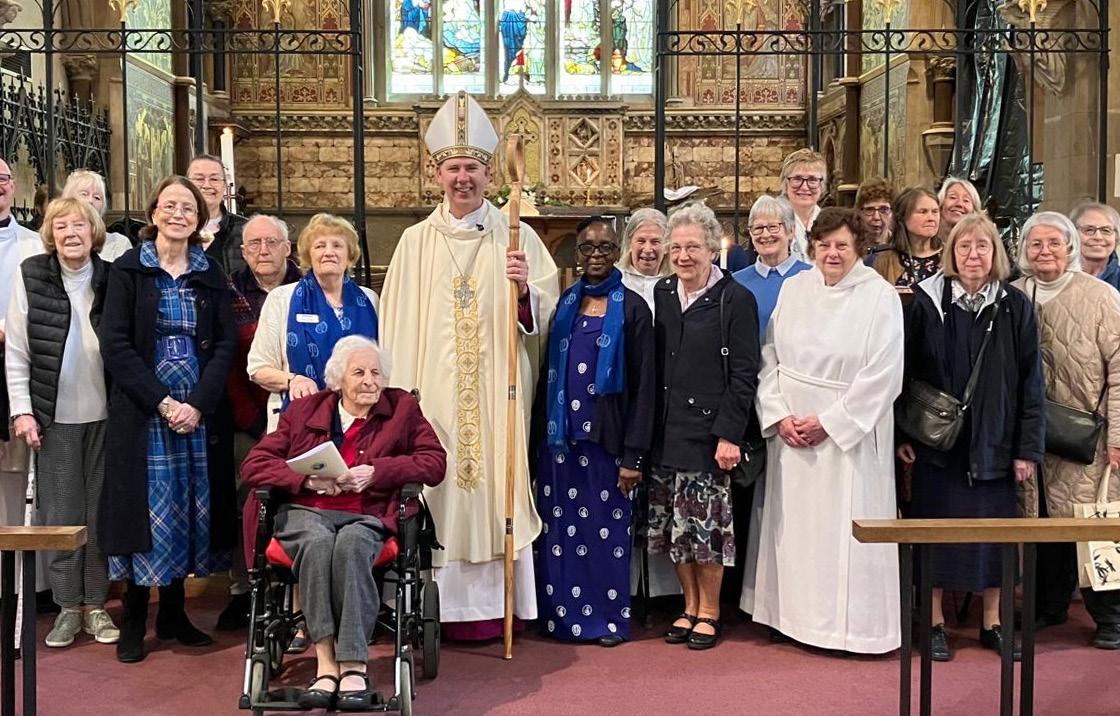
On Saturday 20 April, Holy Trinity, Tulse Hill opened its new handbuilt hall.
Building works took place over a sevenyear period with the help of over 600 volunteers and a handful of contractors. The hall is made from recycled and upcycled materials including straw-bales, which are a waste product of agriculture. The building is carbon-negative and almost entirely recyclable. Unique in its design and execution, the hand-built structure extends over three floors and includes space for seating of 120 people. It is hoped that the building will be in use for more than 150 years.
During the opening, visitors had the opportunity to explore the building, experience its beauty and understand
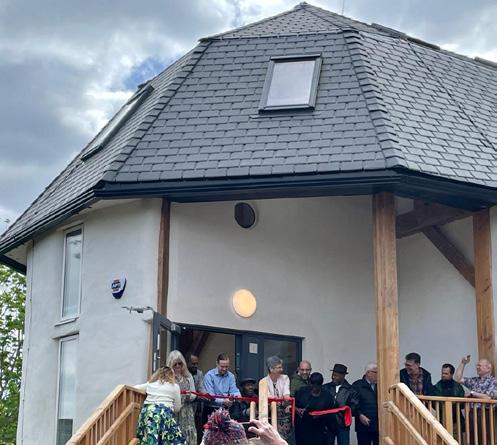
more about its negative carbon footprint, while learning about its construction.
Talking about the opening, the Revd Richard Dormandy, Vicar said, “This has been an incredible journey of endurance and joy on which we’ve all learnt so much. Now we start the gradual transition towards making this amazing resource a first-class neighbourhood hub.”
For further details contact Richard by email at: richdorm@googlemail.com
On Easter Sunday, Sybil Andrew, Southwark Pastoral Auxiliary (SPA) at St Johns Church, West Wickham celebrated her 90th birthday.
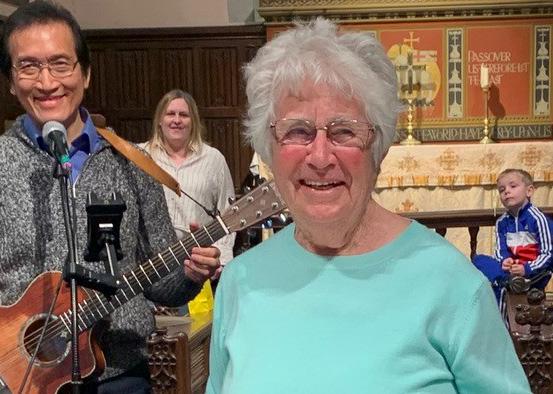
To celebrate her milestone, the congregation at St John’s surprised Sybil with a cake at the end of the service.
Penny Seabrook, SPA said, “Sybil was commissioned in 1994 so is thought to be
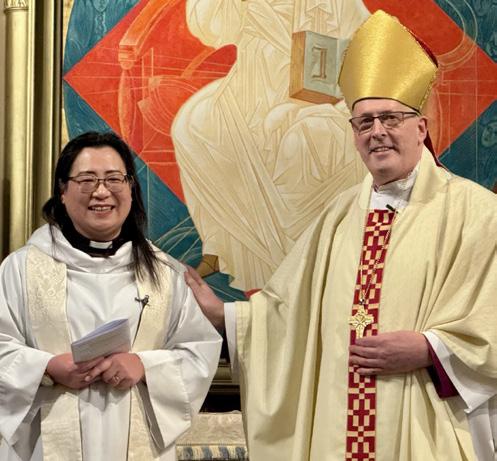
the longest-serving SPA and is still very busy in our church. She was delighted to receive a card from Bishop Christopher and flowers from the SPAs in Croydon and the Diocese.
“Sybil had a career in teaching French and translating before that. She kept up her French, going to France every year. For 25 years she served on the Premier Radio helpline, has done much to do with bereavement support, using her training and personal experience.
“She has hosted a home group for many years and has a wide circle to friends and colleagues who she is in touch with, holidays with and, at times supports through their bereavements. She is planning to start another Bereavement Journey course with me in a few weeks’ time so is still looking forward and an example to us all!”
 Left: The congregation at St Michael, East Wickham have welcomed the Revd Yunghee Koh as their new Vicar. Yunghee was licensed by Bishop Christopher in January. Right: On 11 April, the Revd Helen Harknett was licensed as Vicar of St Philip and St Mark, Camberwell.
Left: The congregation at St Michael, East Wickham have welcomed the Revd Yunghee Koh as their new Vicar. Yunghee was licensed by Bishop Christopher in January. Right: On 11 April, the Revd Helen Harknett was licensed as Vicar of St Philip and St Mark, Camberwell.

During Lent, the Rt Revd Dr Martin Gainsborough Bishop of Kingston and lead Bishop for the environment – led six pilgrimages across our Diocese, each with a focus on different aspects of the climate and ecological crisis. The Revd Vanessa Elston, Chaplain to Bishop Martin, reflects on the power of pilgrimage to grow our vision for a humanity reconciled and creation restored...
We walked through rural parts of Surrey, across commons in Richmond and Wimbledon, along the river Thames in Deptford and Greenwich and through inner urban estates in Brixton. We were accompanied by secondary school children from Trinity Church of England school walking in Lewisham and set out early from Battersea Power Station on our final pilgrimage to Southwark Cathedral to be met by Bishop Christopher before the Chrism eucharist on Maundy Thursday.
Why do a pilgrimage for the climate?
Pilgrimage takes us outdoors, out of our everyday routines, we slow down to a walking pace for the day and have time for conversations with one another, we also pay attention to the places we are walking through in a more intentional and prayerful way. People often undertake pilgrimage because they are facing a particular problem or challenge, when
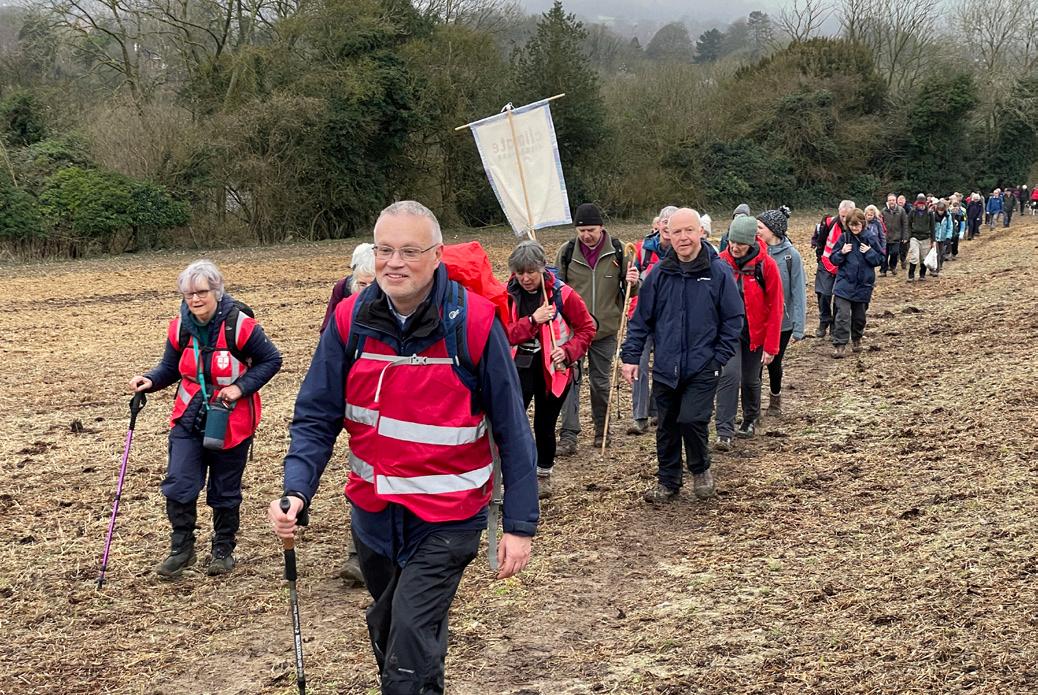
they are in a life transition, or seeking some kind of inner transformation. This ancient religious practice therefore feels very appropriate to this moment where, in the face of climate and ecological breakdown, the need for change at every level of our society is increasingly urgent. Pilgrims also often travel with others, seeking companionship on their inner and outer journeys. So too, in the face of the overwhelming threat of climate change and biodiversity loss, we also need the encouragement and support of others – companions who are waking up to the momentous challenges of the times we are in and how we might be called to respond.
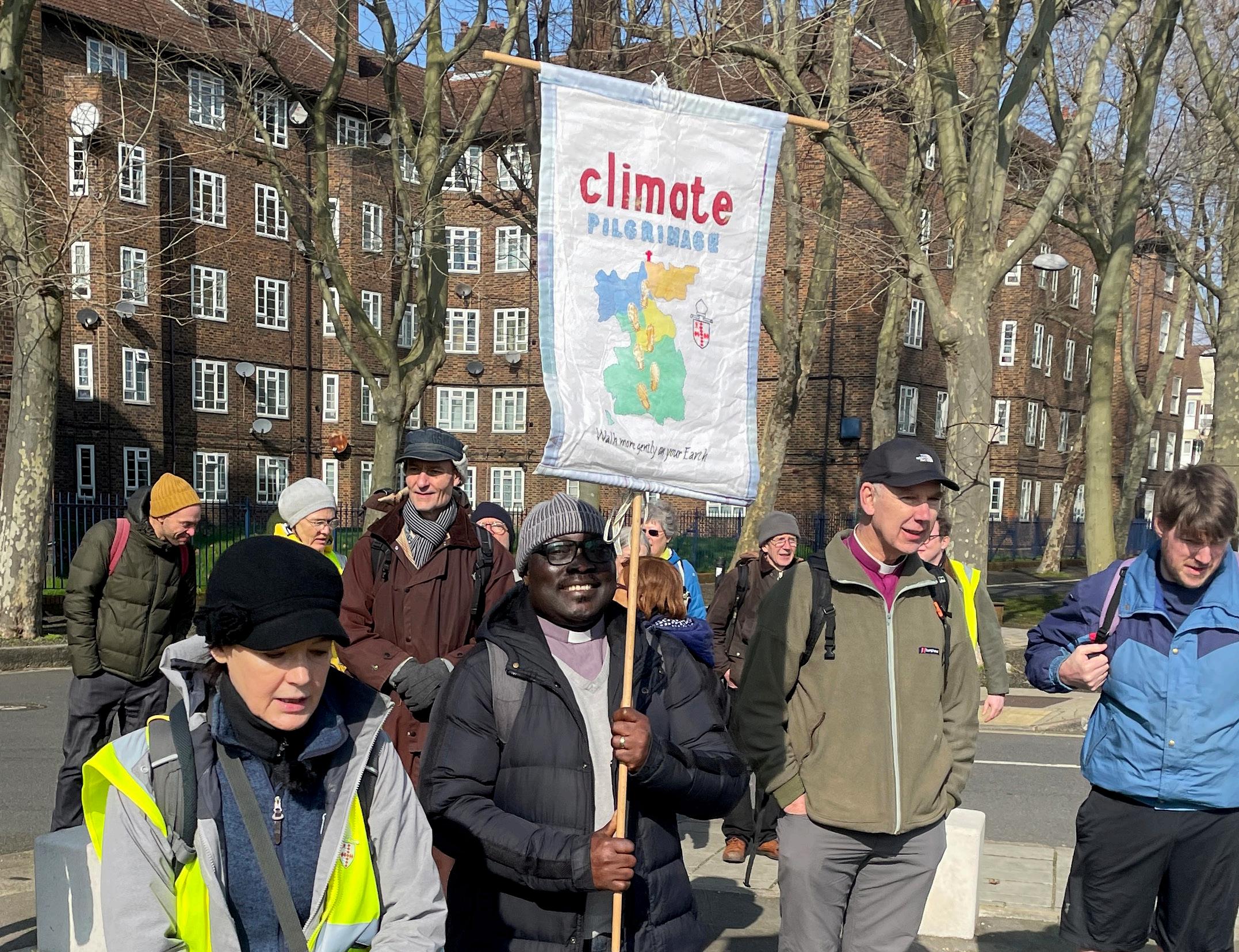
What makes a walk into a pilgrimage?
One of the questions we had before embarking on this venture was would a day’s walking actually feel like a pilgrimage? Was it long enough for us to become a band of pilgrims? I think for most of us who took part the answer was a surprising “yes”. We started with a reflection from Bishop Martin on the need for us to become ‘contemplative human beings’, quoting Rowan Williams: “Contemplation is the only answer to the unreal and insane world that our financial systems and our advertising culture and our chaotic and unexamined emotions encourage us to inhabit. To learn contemplative practice is to learn what we need so as to live truthfully and honestly and lovingly. It is a deeply revolutionary matter.”
We prayed together “let our steps today be a sign of our willingness to change” and set out to walk with open hearts and minds. We stopped along the way for reflections on the history of particular places and the people that had shaped them. This connected us with stories of injustice, biodiversity loss, exploitation, migration, and the indifference of bureaucracy and global finance to local needs – but also with stories of resilience and courage, of the difference one person can make. At our lunchtime stops we lamented, sang and prayed together in ways that felt alive, urgent and needed. Walking a section of our route in silence brought a powerful sense of belonging and becoming a pilgrim people. At our final stopping point we reflected on our shared experience and what a journey of deeper change might look like for our churches and communities. All of this contributed to our sense that, even for a limited period of time, we had entered into the more liminal and open space that pilgrimage offers.
The importance of the small steps we are taking
We can feel powerless to make meaningful change in the face of the resistance of the economic and political mindsets that continue to serve the vested interests
Pilgrims talking together while walking through Brixton. Pilgrims on the march through Reigate.of the status quo. One of the other important outcomes of our pilgrimage was hearing about the small steps our churches are taking with Eco-Church, and to celebrate these actions as part of our call to witness to our vocation in Christ as earth – keepers and protectors. We felt the benefits of eco spirituality, of the opportunity to worship and pray in creation. It reminded us of the basic need to have access to healthy and flourishing green spaces, that we are part of a precious interconnected web of life that we destroy at our peril. Bishop Martin planted trees in two church gardens as a sign of our commitment to nurture the biodiversity of our church lands, as well as to what these refuges might offer in terms of worship and mission to the community. We felt the power of small steps taken in faithfulness and how God might multiply and grow our efforts.
We are all being invited to become pilgrims on a journey of deeper change
The climate and ecological crisis works across every part of our society, particularly impacting upon those who are poorest and most vulnerable. It cannot be tackled without addressing the global issues of increasing inequity and racial injustice. The crisis also cannot be solved at a technocratic level alone, but requires a fundamental shift in how we see ourselves in relationship to our human and non-human neighbours, a re-imagining of how we might live ‘more gently’ on the earth for the flourishing of all. This requires a journey of “metanoia” – repentance, a change of heart and mind. To preach the gospel is to call people to this level of repentance and re-thinking, it is to engage in an ongoing journey of discipleship and willingness to be changed in every aspect of our behaviour and attitude. We must desire and seek a new way of living together, an embodied sign of what is means for Christ to reconcile all things on earth and heaven.
With the Revd Helen Burnett, Bishop Martin, I am working on a resource to enable parishes to undertake their own pilgrimages.
We want to offer this in the belief that pilgrimage offers a powerful way to connect to the history and ecology of a parish and deanery. It gives us a chance to reflect, pray and envision together; to become God’s ‘priestly, prophetic and pilgrim people’ for such a time as this.
We also want to thank all those who worked with us to make the climate pilgrimages possible, particularly the walk leaders: Judith Russenberger, Keith Ison, Revd Barbara Moss and Revd Sharon Moughtin, the volunteer stewards and for the hospitality of the churches who provided soup, cakes, hot drinks and loos to pilgrims. We could not have done this without you.
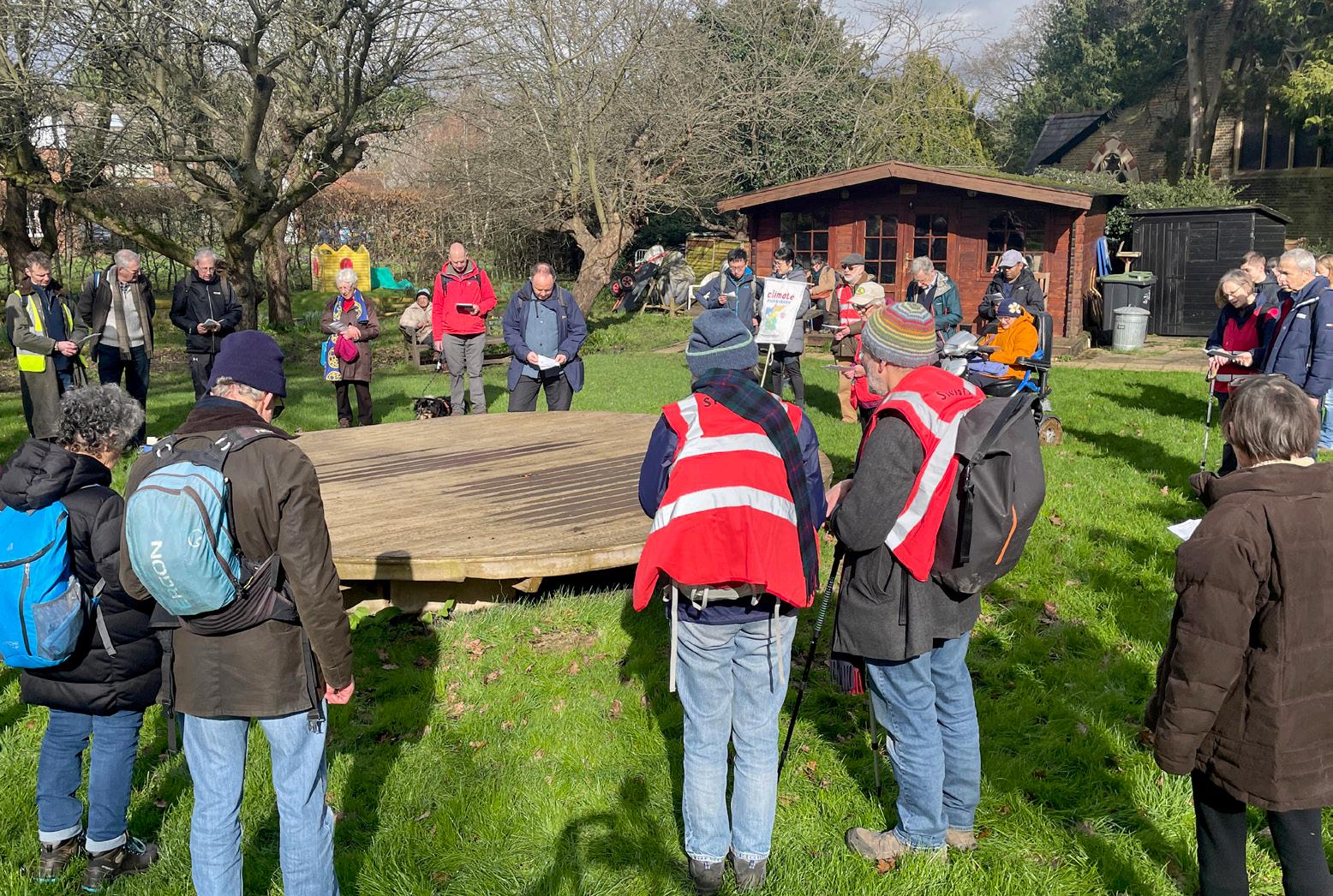
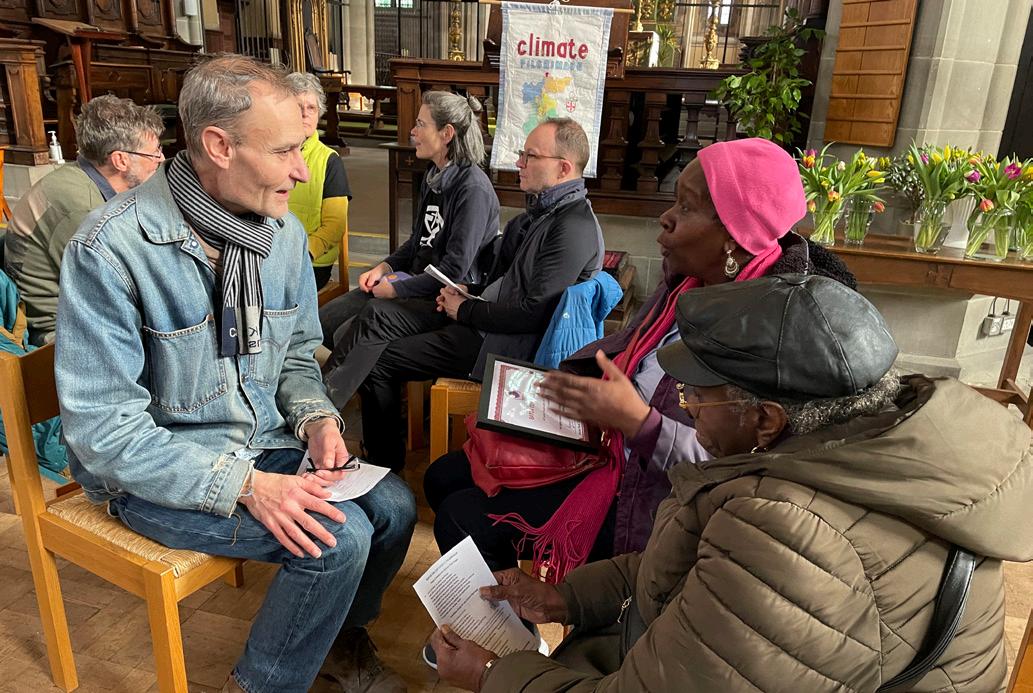
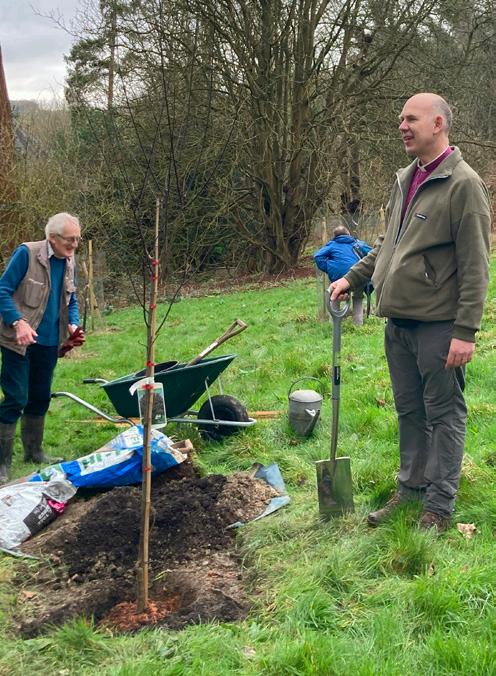
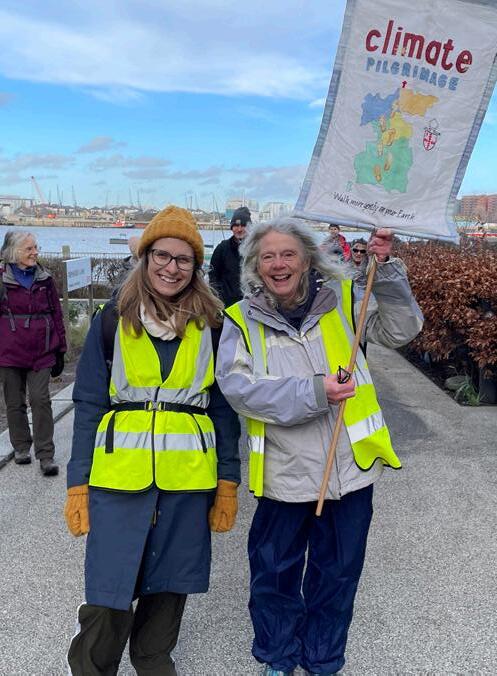
 All photos © Tim Dendy (except Cathedral). Top: A prayer stop in the garden at St John the Baptist, Kingston. Middle: (l–r): Group reflections for a journey of change at All Saints ,Tooting; Happy Pilgrims at the Greenwich Peninsula. Below (l–r): Bishop Martin plants a tree in the garden at St Katherine; Merstham. Bishop Christopher welcoming pilgrims at Southwark Cathedral, the final stop for the pilgrimage.
All photos © Tim Dendy (except Cathedral). Top: A prayer stop in the garden at St John the Baptist, Kingston. Middle: (l–r): Group reflections for a journey of change at All Saints ,Tooting; Happy Pilgrims at the Greenwich Peninsula. Below (l–r): Bishop Martin plants a tree in the garden at St Katherine; Merstham. Bishop Christopher welcoming pilgrims at Southwark Cathedral, the final stop for the pilgrimage.

With strong support from its Chair of Trustees, Bishop Martin, St Augustine’s College of Theology has committed itself to be more ambitious in addressing the climate and ecological crisis in its worship and use of resources, but also in the way theology is taught and in how students’ spiritual and ministerial formation is fostered.
St Augustine’s is the Church of England’s longest-standing non-residential theological college. With teaching centres in Southwark and Kent, the college attracts people from across the South East, including the Diocese of Southwark, and from a wide range of backgrounds. People come to St Augustine’s to study theology full-time or part-time, often as part of training for licensed lay or ordained ministry.
As part of this programme of development, the college is launching a new master’s degree (MA) pathway –which will be ‘Theology for a Planet in Crisis’, delivered from September 2024. The pathway will enable students to engage with the questions raised by the climate crisis in theological depth and from a wide range of perspectives. A key
element will be practical learning through placements undertaken with agencies working in areas of ecological concern. Like St Augustine’s other postgraduate programmes, this MA pathway is aimed at people who have previously studied theology (or equivalent), including clergy and licensed lay ministers, and who wish to undertake further studies as part of their continuing development.
The pathway will be delivered at and in partnership with St John’s, Waterloo – the first church within Southwark Diocese to receive a Gold EcoChurch Award.
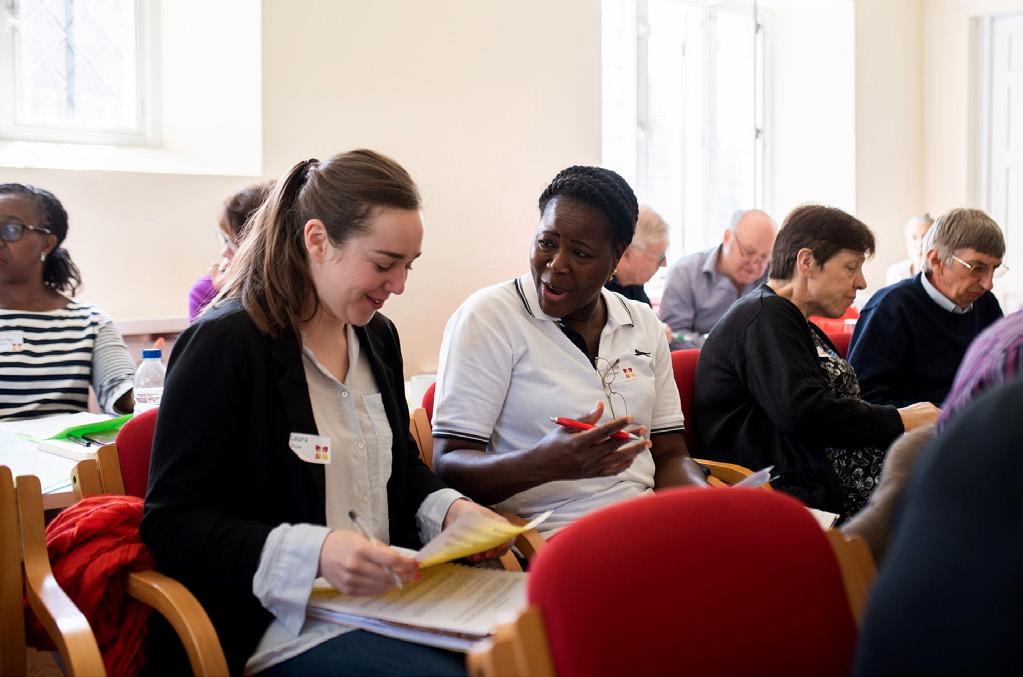
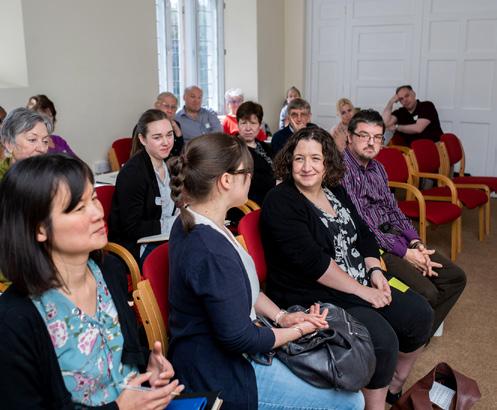

More information, including how to apply, can be found here: bit.ly/4aEtdJ2
Contact Rebecca Young, Head of Operations at: r.young@ staugustinescollege.ac.uk
On Thursday 7 March, the Kingston Racial Justice Group hosted their first event of the year – an online evening of short talks and discussions around twin themes; “I don’t see colour”, and “what makes a good ally in the cause of racial justice?”
The group will come together inperson to hold their second event on 13 June 2024 to focus on how to become better allies following on from discussions during their first event.
Reflecting on the success of this engaging event, the Revd Mark Eminson, Team Rector of Merton Priory Team Ministry and Vice Chair of the Kingston Racial Justice Group and Julia Nimmons, church member at St James, Clapham write:
The purpose of our first event was to encourage reflection and discussions, within a safe space, on what both these things mean to us.
On the night, we had three introductory talks to kick off the discussions. Firstly, Bishop Martin shared his views, rejecting the statement “I don’t see colour”. He focused on how it downplays issues around racism and racial injustice, whereas there is a profound diminution of sense of self and worth caused by racism in our communities.
Following that, Lorraine Thomas of Immanuel and St Andrew’s Church, Streatham, shared some recent real-life experiences where people claimed to her that they either did not see colour or were not racist in any way, despite their comments and attitudes suggesting otherwise. After sharing how she had used her voice to be an ally in those situations, she left us with a question: in these situations, would we have called
out the racism and would we have been good allies?
The final talk was rounded off by Julia Nimmons who reflected on more of the theoretical aspects of what “I don’t see colour” means to her; observing the rise in the use of the phrase since the emergence of the Black Lives Matter movement which began in 2020. She argued that even if it is well-intentioned, it is actually a failure to recognise and acknowledge that racism still exists – and if that’s where it stops, then we will not be open to effecting change and justice for any marginalised groups.
After these hard-hitting talks, the 60 or so attendees went into smaller breakout rooms where we could openly discuss our views around both themes, sharing our experiences and reflections. At the end of the session, Bishop Martin gave us all a call to action. He asked, “How would people like things to be different in five years time?” We explored how these views
For details about open events: bit.ly/4b3xzcB
You can also visit St Augustine’s YouTube channel: bit.ly/3vTFhHf

might guide tangible actions that we can look to implement.
If you are interested in listening to any of the three talks mentioned, please contact Mark by email at: eminson.mark@gmail.com
Top and left: People study theology at St Augustine’s, often as part of training for licensed lay or ordained ministry. Right: The Revd Ellen Eames, Priest-inCharge at St Christopher, Walworth addresses learners at St Augustine’s.
Christian Aid Week, takes place 12–18 May – seven days, so many ways to make a difference. Every Christian Aid Week, people across Britain and Ireland raise funds, act and pray for their global neighbours in a celebration of hope for a fairer world.
This year’s appeal focuses on the organisation’s work in Burundi, one of the most densely populated and poorest countries in Africa. Heavily reliant on agriculture, it’s also one of the least prepared to combat the effects of climate change, including droughts, floods and landslides. The global cost of living crisis has intensified the challenges: more than 70 per cent of the population live in poverty and more than half of children are chronically malnourished.
Christian Aid has been working in Burundi since 1995 when it first offered humanitarian assistance to people surviving the civil conflict. Now, alongside local partners, the organisation helps establish Village Savings and Loans Associations (VSLAs). These communityled groups mean people can save and borrow money, making small businesses possible, offering reliable and diverse incomes so families can eat regularly, get medicine when they need it, and build safer homes.
Thirty-five-year-old Aline Nibogora is the chairperson of a VSLA which supports some 25 families in a remote village, in Makamba Province. Aline escaped an abusive marriage only to find herself on the streets begging for a place to stay. Her life changed when she went to a three-day, Christian Aid-funded community workshop. With a small startup loan, Aline began trading avocados and peanuts locally. She’s now a grocery wholesaler and living on her own plot of land where she’s building a home for her family. In the next five years she hopes to expand, so one day she can buy a mill. This will provide a source of income without the need to transport heavy goods over long distances.
“I don’t want my children to have a painful life like mine, remembering it makes me weep. I could never have dreamed I would one day have a brick house and
be a successful businesswoman, able to feed and clothe my children. This is a plan and I will do it; I am a woman who is an achiever.”
“I
don’t want my children to have a painful life like mine, remembering it makes me weep.”
This Christian Aid Week, supporters are once more stepping up, knowing that every prayer, every gift, every action helps transforms lives.
There are seven days and so many ways to make a difference – whether that’s church services, special collections, Christian Aid Big Brekkies, or even a Bible ‘readathon’. For those who like a physical challenge there’s a new option for 2024 with the chance to take part in 70k in May. You can cover the distance in any way you like, take part by yourself or with a group, and share your progress on a dedicated Facebook page.
Find out all the ways you can support Christian Aid Week by visiting its website: christianaid.org.uk/appeals/keyappeals/christian-aid-week
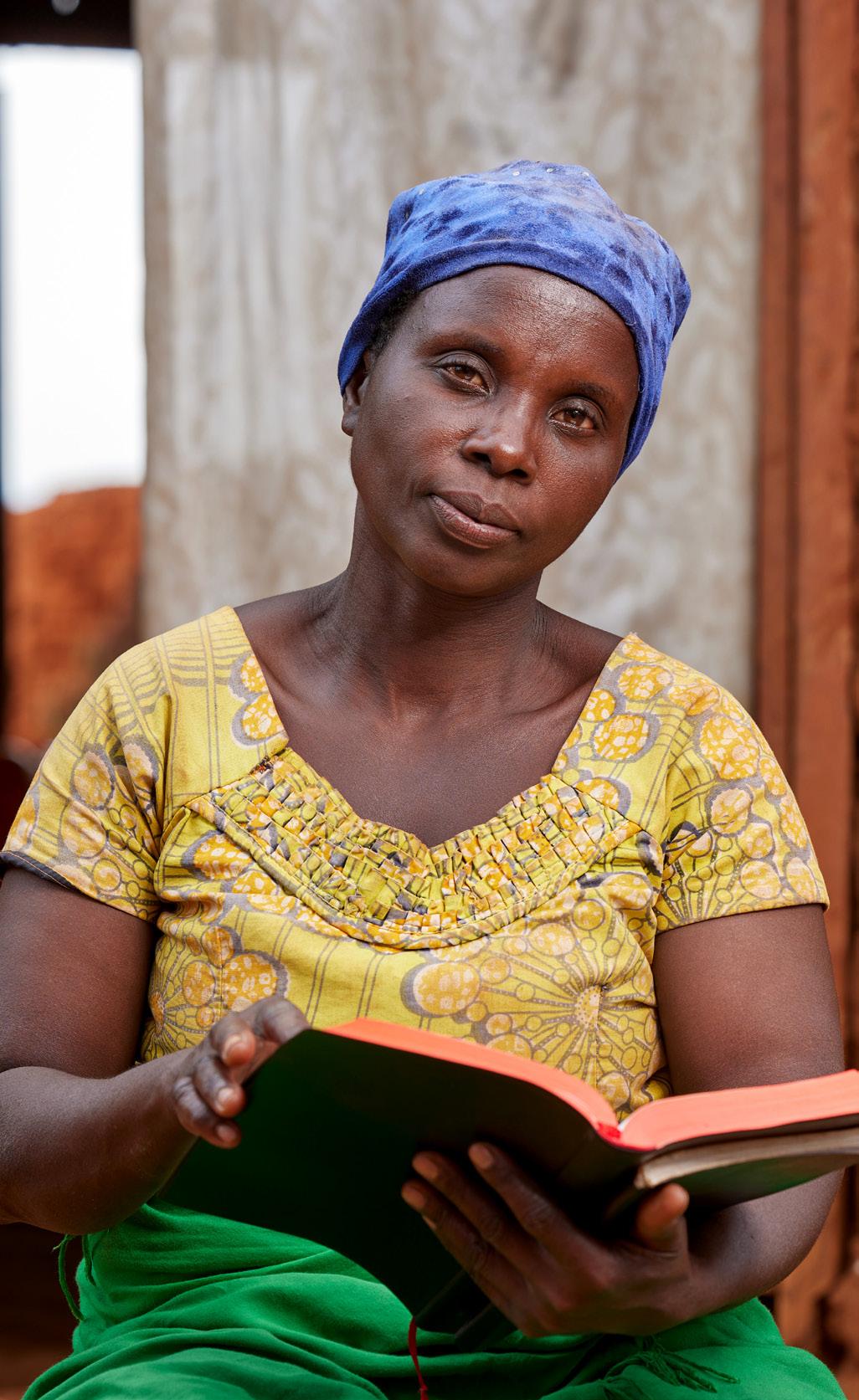
What could your donations buy?
£5 could buy a savings book for a member of a VSLA, setting them up to start their own small business and become financially independent.
£30would help a family buy two Jerrycans to collect water from the river to carry back to their farm. Jerrycans provide irrigation to crops, especially during the dry season, maintaining food production for the family.
£50would mean a vulnerable family can purchase a water storage tank. Water can then be stored for a few days rather than travelling to the communal water point, allowing instant access to water for washing, cleaning and cooking.
£100could help a woman set up her own small business with a starter kit; including money to purchase her first few items to sell. This means she could supply local grocery shops or restaurants with vegetables, set up a roadside shop, or buy maize to sell in bigger markets like Bujumbura.
£100could also help buy a family a bicycle meaning easier transport to school, quicker access to medical treatment in emergencies or support carrying produce from farm to market.
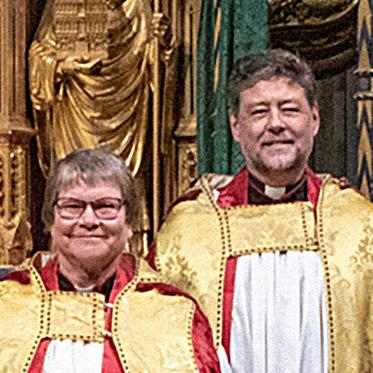
In our series unpacking the priorities of the Southwark Vision, Jeremy Clark-King and Wendy Robins write...
St Augustine says, “Without God we cannot; without us God will not.” It seems to be stating the obvious, but it is only through the faithful service of people across our Diocese that the reconciling and loving mission of God is being carried out.
All those who are baptised are given the unique gifts they each need to engage in that mission in the way that only they can as God calls them. Most people live this call out by being faithful worshippers, caring neighbours and colleagues, devoted parents, or friends. Some are called into specific forms of ministry; some as lay ministers some as ordained. Included in our Diocesan Vision is a deep commitment to ministry in all our parishes and to the growth of ministry in all its forms. This means enabling more people of all backgrounds, ethnicities and ages to discover and grow into their vocations. We’ll be looking to

Rogation
create new pathways to ministry alongside our existing ones into commissioned and licensed ministry – particularly for children and youth workers. We’ll also be exploring those things that deter people from offering for ministry or from completing their training, for instance a short course to help those who want to be commissioned to preach occasionally in our parishes.
We want to see more people able to serve as affirmed, commissioned, licensed and ordained ministers and we want to see a lower average age and a richer diversity. And, of course, it’s not just numbers that matter – we need our ministers to be well trained, strategically deployed, wellresourced and well supported. We aim to have the highest possible number of clergy serving our parishes and equipping and enabling lay ministry in all its forms. As a Diocese, we want all those in ministry (including churchwardens and musicians) to flourish in their ministries; so clergy and lay well-being will become increasingly important. We will offer courses to equip our clergy to think about how to enable well-being for our laity and our website points to useful help. (bit.ly/4bnzJnB)
The Venerable John Kiddle Archdeacon of Wandsworth
The sixth Sunday of Easter, which falls this year on 5 May, is known as Rogation Sunday. The weekdays that follow it are known as Rogation Days, leading to Ascension Day on the Thursday of that week.
Rogation is an ancient festival which, through prayer, seeks the well-being of its local community. The name derives from the Latin word rogare which means to pray, or to ask.
There has been, since mediaeval times, a tradition of ‘beating the bounds’ of the parish, praying for God’s blessing upon the land and crops. The community
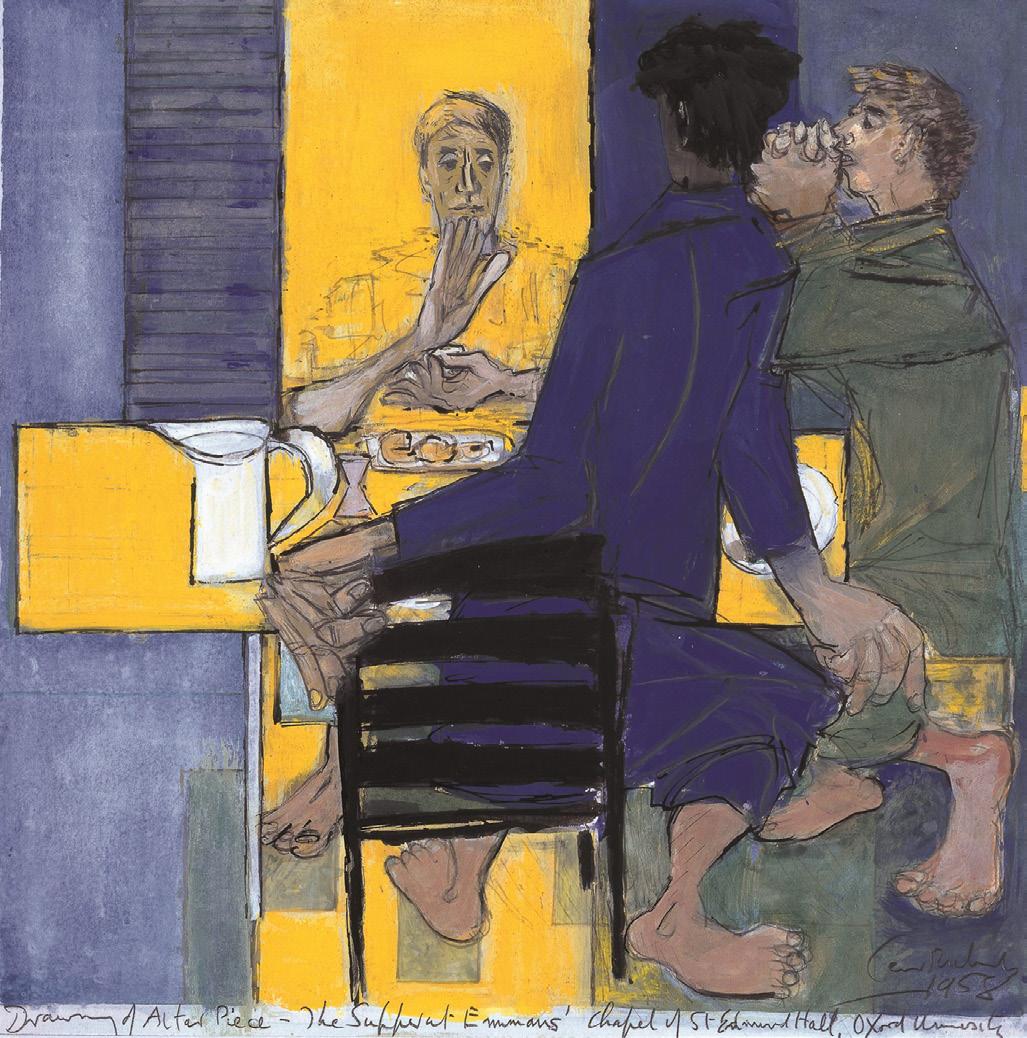
In addition, we will ensure there are resources to help with our lay ministers well-being.
At its very best, ministry is always a gift – both to those who are served and to the one serving. Through our renewed Vision and in partnership across our diocesan family, we want to see ministry increasingly be received and celebrated as the gift that it is to our Church and to God’s world.
Wendy Robins is Director of Discipleship, Lay Ministry and Continuing Ministerial Development. Jeremy Clark-King is Director for Clergy Formation and DDO.
Details of Southwark Vision and the core document can be downloaded at: southwark.anglican.org/southwarkvision
processes and, with hope in the goodness of God, prays for the success of endeavours, agricultural and industrial, which enable all people to flourish. It’s a tradition which we might do well to renew.
In an era in which we increasingly live in tribes and speak in echo chambers, Rogation invites us to hold all in our prayers and to come together in local communities to pray and work together for the common good.
At a time when spirituality can be turned inwards, narrowly focused on individual well-being, Rogation invites us to look outward, earthing our prayers in the soil,
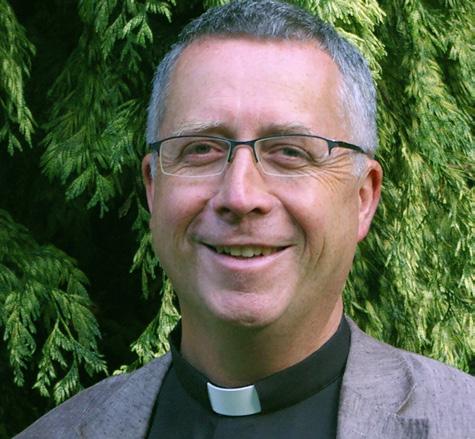
opening our eyes to our local community and to the world, and seeking the wellbeing of all.
As the pace of climate change increases, as we realise more urgently the need for peace and justice, Rogation brings us back to the Lord’s Prayer and a wide vision of God’s kingdom on earth and a simple dependence on God for our daily needs.
Thy kingdom come, thy will be done, on earth as in heaven
Give us today our daily bread
• How, this month, might you embrace Rogationtide and ‘beat the bounds’?
• Where might you walk with others, with eyes open, to pray for your community?
• How might your prayers move you to work more strongly for the common good, locally and globally?
We seek your blessing for the communities in which we live and work
We seek your favour for those who farm the land and care for it
We seek your justice for the world and your peace for the earth.
As we pray
Open our eyes, soften our hearts and shape our wills
That through our lives as well as our prayers
We, with all people, may know your abundant goodness. For Jesus’ sake Amen.
Image: © Trustees for Methodist Church Purposes, Ceri Richards TheUNTIL 1 JUNE
BRIXTON – ‘Behind the Blue Doors’: an exhibition by Jim Grover. At Lambeth Archives, 16 Brixton Hill, SW2 1ET. Open: Mon 1–8pm; Tue & Thu 10–6pm; Fri 10–3pm; Sat 9–1pm, 2–5pm. Wed & Sun closed. Free.
TUESDAY 7 MAY
GREENWICH – Social History in Focus. Join St Alfege Church for an insight into our history. 6.30pm at St Alfege, Greenwich. Free. Details at: bit.ly/3Um3Ndf
THURSDAY 9 MAY
ONLINE – Torch Trust: Introduction to Sight Loss Friendly Church. A brief overview of what it means to be a sight loss friendly church. If you’re thinking of signing up your church or would like to refresh old knowledge, join us for an overview and hear stories about sight. 2–2.45pm. Free. Register at: bit.ly/3IGAnQp
♫ Concerts at St John the Evangelist, Upper Norwood
COFFEE CONCERTS: 11.30am –12.30pm (coffee & cake 11am)
Saturday 4 May: Stockwell Winds –Serenade No 10: Gran Partita, Mozart
Saturday 1 June: Jayden Lamcellari, cello; Julian Chan, piano; finalist
Haslemere Intl. String Competition
ORGAN CONCERTS: 7.30pm
Thursday 16 May: George Herbert, (Chapel Royal, Hampton Court)
Thursday 20 June: James Gough, (Southwark Cathedral)
Venue: St John the Evangelist, Sylvan Road, Upper Norwood, SE19 2RX
Admission FREE, retiring collection. Details at: sjun.org.uk
SATURDAY 11 MAY
♫ SOUTHFIELDS – Putney Choral Society Concert: Vivaldi Gloria and Magnificat and Dan Forrest Requiem for the Living. 7pm at St Paul’s Church, Augustus Road, Southfields, SW1 6EW (accessible facilities). Tickets: £22 (incl. programme & refreshments), at the door (card only) or from: bit.ly/49YNusws
SATURDAY 11 & 25 MAY
GREENWICH – Hidden Spaces Tour
Join St Alfege Church, Greenwich at 11.45am to discover spaces usually closed to the public and hear about the lives of those who served and worshipped at St Alfege Church. Tickets £9, details: bit.ly/3Um3Ndf

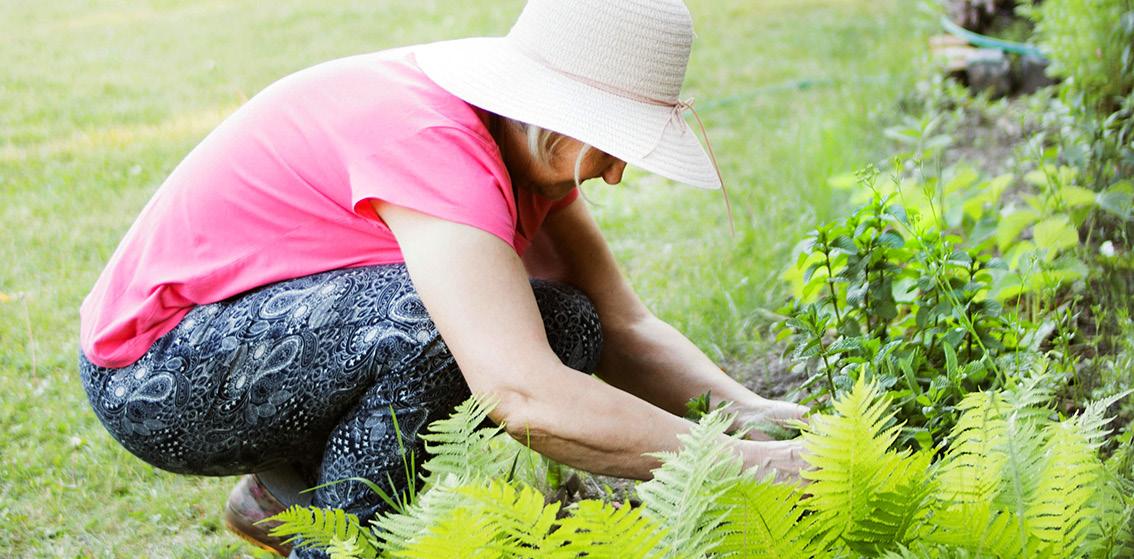
Is there a volunteer in your parish you would like to say thank you to?
Next month is National Volunteers’ Week which takes place from Monday 3 to Sunday 9 June. As the nation celebrates 40 years of Volunteers’ Week, it’s a time to focus on inspiring more people in our communities to make a difference.
To share your appreciation for volunteers, we will be shining a light on people across Southwark who selflessly
26 MAY – 8 JUNE
BLACKHEATH – Art Gallery Exhibition: local gallery, exhibiting in our beautiful church; with musical opening evenings. All net proceeds go to local charities and foodbanks. St Michael & All Angels, Blackheath Park, SE3 9JL. Free. Details at: se3.org.uk/smag
MONDAY 3 JUNE
ONLINE – Torch Trust: Sight Loss Friendly Church Q&A. Meet our expert panel from Torch Trust and ask your questions around welcoming and including blind and partially sighted people in all aspects of your church. 2–3pm. Free. Register at: bit.ly/49PVcVI
give up their free time to go above and beyond to lead and serve.
If you would like to recognise the voluntary work of someone in your church community, email: bridge@ southwark.anglican.org with the name of the volunteer you would like to thank, a description of what they do in your church and a high quality photo. Please make sure you have consent to share their story. Submissions need to be emailed by 10 May.
SATURDAY 8 JUNE
SOUTHWARK CATHEDRAL – Mothers’ Union Festival Eucharist. 11.30am, with commissioning of the new MU Chaplain, the Revd Sandra Schloss. Free.
SATURDAY 29 JUNE
♫ NUTFIELD – Organ recital by Malcolm Archer – Bach, Elgar, Franck, Vierne, and the premiere of Four Hymn Preludes by Malcolm Archer. 6.30pm at St Peter and St Paul, Nutfield, RH1 4JA. Admission: £15.00 (free for school-aged children). Tickets at the door. Details: bit.ly/4aHlom0
Behind the Blue Doors is a new photography exhibition celebrating the 200th anniversary of Trinity Homes Almshouse by award winning photographer, Jim Grover.
It reveals the fascinating story of an almshouse in the heart of Brixton, endowed in 1824 by Thomas Bailey, a successful china and glass merchant, and which continues to offer accommodation, for those in need, 200 years later.
The exhibition includes over 50 contemporary photographs and interviews, that bring to life the current residents, their life stories and their homes – as well as documents, prints and portraits from the nineteenth century that shed light on the almshouse’s first 100 years. It also includes documents and objects going back some 200 years as well as some personal possessions that the current almshouse residents have selected which highlight the diversity of their lives.
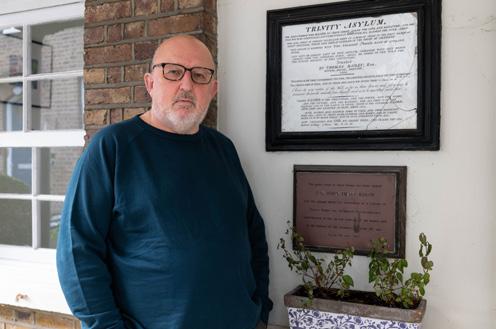
Photographer Jim said, “I’ve often wondered what lay behind the blue front doors of this distinctive Georgian building on Brixton’s busy Acre Lane, and which are always firmly shut. Who lives there and what are their stories? How did it come to be here and who was the man whose name is prominently displayed above its doors? It’s been a wonderful voyage of discovery for me, full of extraordinary revelations that span 200 years. I am so pleased to be able to throw open the doors and share the remarkable and inspiring stories that lie behind them.”
Grover, whose photographic passion is to celebrate daily life, people, ‘unsung heroes’ and local communities, and ‘to make the unseen seen’ has built up close and trusting relationships with the current residents who feature in the exhibition. He continued, “Coupled with the inspiring stories of two, hitherto unrecognised, Brixton residents, the founder Thomas Bailey and his nephew John Illidge (who
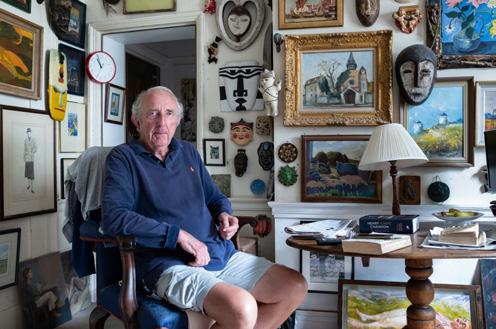
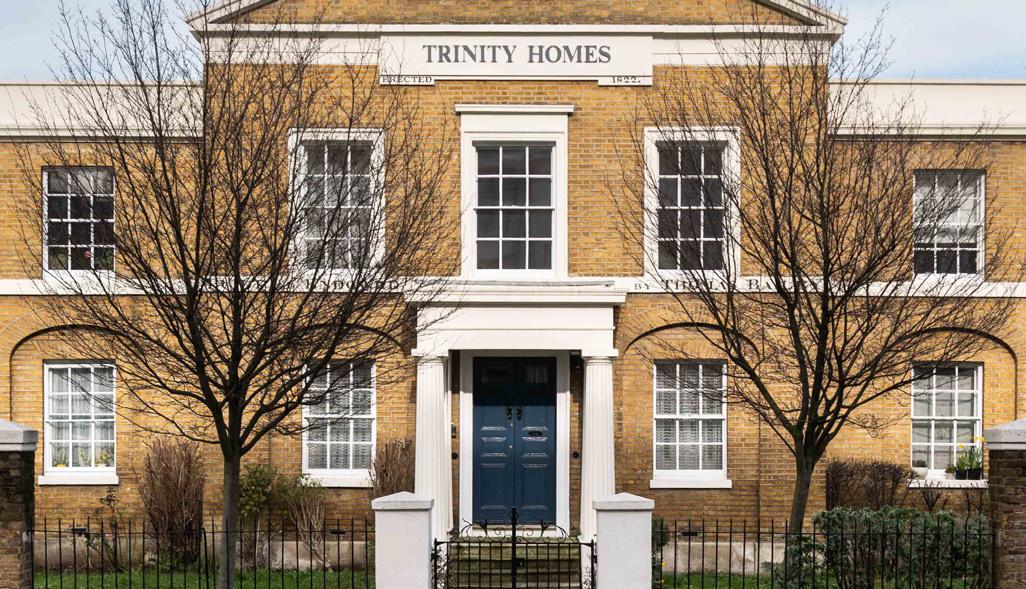
This year, Trinity Homes almshouse celebrates its bicentenary. It is currently home to 17 residents, a warden and a cat.
turns out to have been the Sheriff of London in 1834), are the remarkable and varied stories of five of the current residents who are leading wonderfully full lives, including making a difference in their local community.”
The exhibition is being staged in the new Lambeth Archives facility in Brixton which
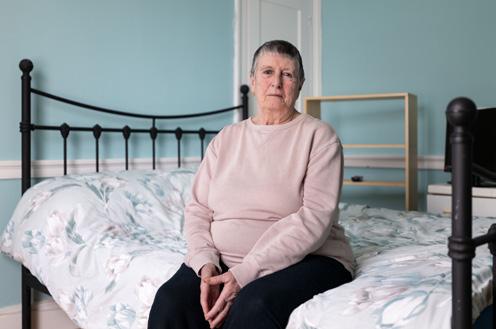
has moved after 133 years of being based at the Minet Library. For those unable to visit the exhibition, there is a 118page book of the exhibition available to purchase in print and digitally.
Further details can be found at: jimgroverphotography.com
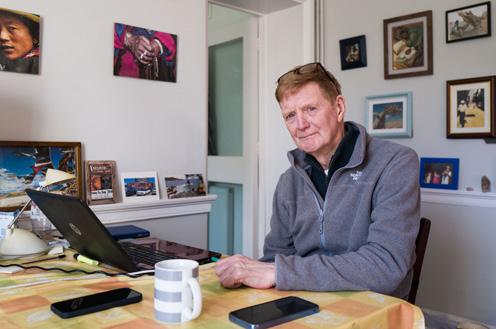
© Jim Grover. L–R: Andrew Taylor is the live-in warden, “Now that we have a newly-decorated meeting room I’m going to see if we can get together a bit more…” Guy Hunting, scours local charity shops for artworks to add to his enormous collection, “People aren’t here by choice…some are here for unfortunate reasons…by ‘force majeure’… but some are great fun.” Christine Holding, has signed up to be a volunteer for The Patients’ Association in her local GP surgery… “I’ve worked all my life...42 years...I’ve got to be doing something…I love meeting people.” Wallee McDonnell volunteers for Celebrate Life, a Community Interest Company, and also facilitates peace education workshops in prisons, “I was homeless. I’d never had my own place…my own front door with a key.”
In 2017 a small group of local Christian artists came together to use the space at St Michael and All Angels Church, Blackheath and host an art gallery to raise money for local charities in the South East of London. The collaboration between the group and the church is named SMAG
“It’s shaping up to be another wonderful event in our beautiful church. There is much joy seeing pieces of art taking over pews, windows, lecterns and more!”
Fast forward to 2024 and so far, a total of £33,200 has been given to charity, and includes donations to Greenwich Food Bank, Greenwich Wildlife Trust, Greenwich Winter Night Shelter, Jericho Road Project, Safe Homes, Debt Centre Greenwich, and of course St Michael’s Church.
The next SMAG exhibition starts on Thursday 30 May and will showcase art until Saturday 8 June 2024.
Prints, landscapes, oil paintings, sculptures, portraits and more are displayed at each exhibition.
Mhairi Veall at St Michael’s said, “It’s shaping up to be another wonderful event in our beautiful church. There is much joy seeing pieces of art taking over pews, windows, lecterns and more!
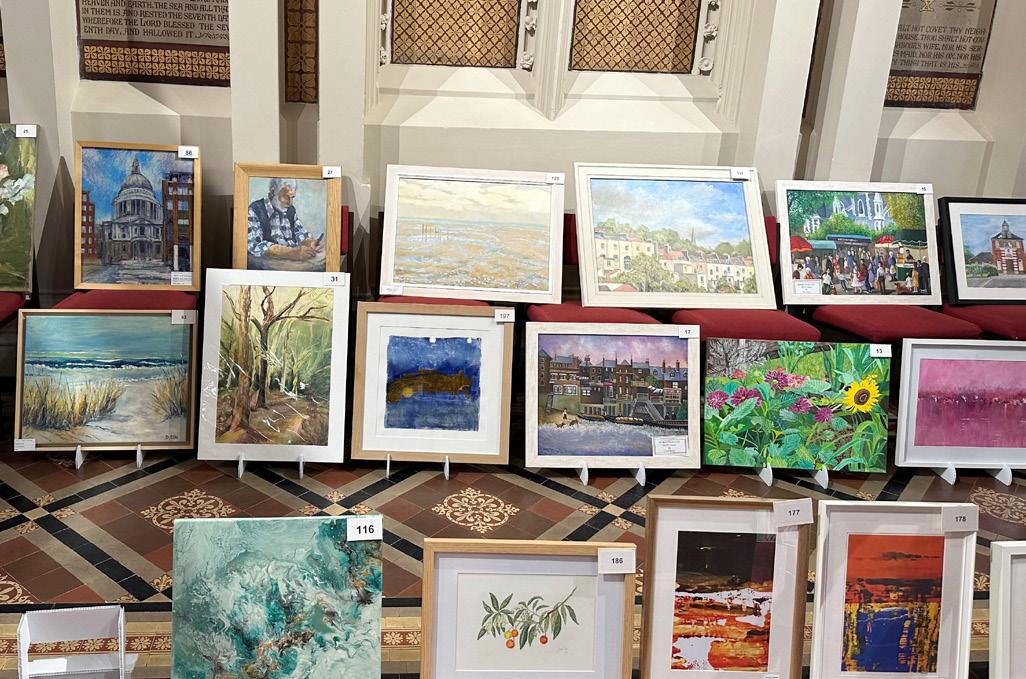
“Every exhibition opens and closes with a music and wine evening, creating a vibrant environment to showcase all the wonderful art that is entered. Our last exhibition hosted 286 pieces of art from 98 different artist and had close to 1,000 visitors – a record for SMAG. It is a wonderful way to connect art, St Michael’s church and the local community.”
Further information
SMAG art is also available to buy online from: smagart.com and for exhibition opening times visit: se3.org.uk/smag
© Jim Grover.